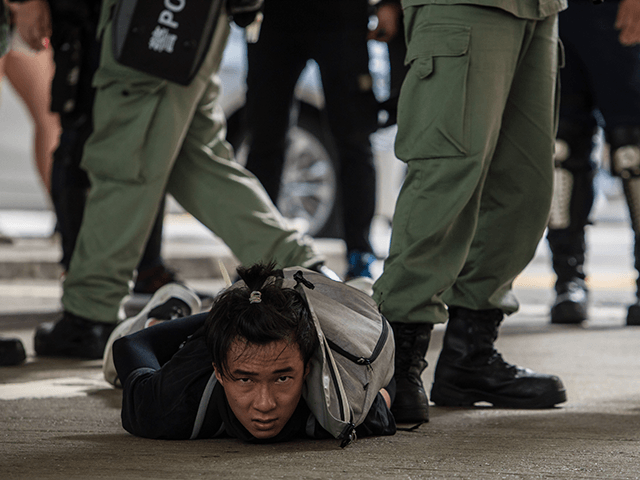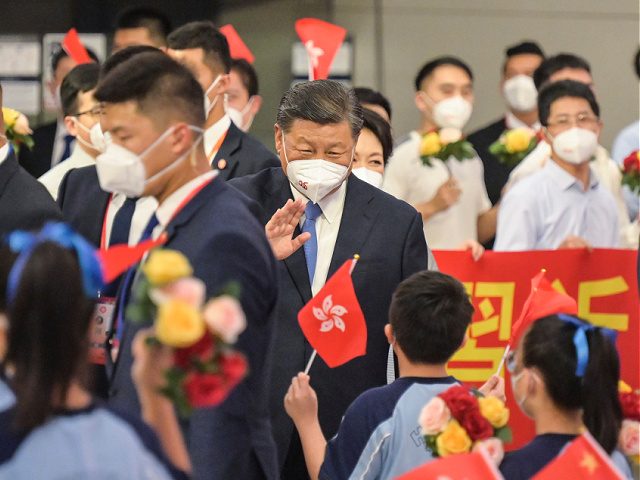Chinese dictator Xi Jinping arrived in Hong Kong via train on Thursday afternoon to attend Friday’s 25th-anniversary commemoration of the United Kingdom ceding control of the island to Beijing.
As China’s state-run Global Times noted, this is Xi’s “first publicly announced visit outside the Chinese mainland since the COVID-19 epidemic started in early 2020.”
The Global Times portrayed Xi’s visit as a victory lap after China broke its promise to respect Hong Kong’s legal autonomy and imposed a tyrannical “national security law” in August 2020 to crush the huge pro-democracy movement that erupted in 2019:
Observers in Hong Kong and the mainland believed that Xi’s visit to Hong Kong amid an increasingly complex geopolitical environment sends a clear message to Hong Kong and to the world that the “one country, two systems” principle is beneficial to the country and to the city, and will be unswervingly upheld for the long term despite smears and doubts by the West.
It also serves as an important warning to some external hostile forces as well as extremist secessionists in the city that the country will never tolerate those who sabotage Hong Kong’s prosperity or the country’s sovereignty, security and development interests.

Riot police detain a man as they clear protesters taking part in a rally against a new national security law in Hong Kong on July 1, 2020, on the 23rd anniversary of the city’s handover from Britain to China. (Photo by DALE DE LA REY/AFP via Getty Images)
The “national security law” criminalizes virtually all dissent from Chinese Communist rule, especially anything the regime views as secession, undermining the Communist system, or colluding with foreign powers. It was not much of a surprise for Hongkongers to learn that the Communists and their puppet city administration consider every form of speech or political activity they dislike to be one of those things.
Last year, the Communists took the extra precaution of rigging Hong Kong’s elections so that only “patriotic” Party loyalists could run for the legislature. Hongkongers declined to participate in the farcical election, producing record-low turnout.
Xi gave a little speech upon arriving at the West Kowloon train station — a grimly appropriate venue, as it was ground zero for the debate over Hong Kong autonomy that would eventually beget the 2019 democracy movement and Beijing’s thuggish crackdown. The beginning of the end of freedom in Hong Kong lay in China claiming jurisdiction over part of the West Kowloon high-speed rail station in 2018.
Xi claimed he has been “all along concerned about and caring for Hong Kong” since his last visit to the island five years ago and said his “heart is always with Hong Kong compatriots.”
Xi euphemistically referred to the crushing of democracy as Hong Kong withstanding “many storms and hardships,” bizarrely claiming the national security law that effectively ended Hong Kong’s autonomy was instead a triumph of the “one country, two systems principle.”
“A brighter future will beckon, if we forge ahead with perseverance,” he said, without noting that perseverance is now mandatory.
Hong Kong supposedly embraced Xi’s visit as a huge confidence-booster after two years of fighting the Wuhan coronavirus, while his choice of arriving by rail was meant as a demonstration of the value Beijing places on the “Guangdong-Hong Kong-Macao Greater Bay Area,” an administrative concept that ties the two semi-autonomous islands to the Chinese city of Guangdong in an industrial and financial development triangle.
The Global Times fell all over itself insisting that Xi’s visit proves Hong Kong has a bright future under Communist domination now that Western plots to foment a “color revolution” have been foiled, but in truth many Hongkongers are trying to flee the island, especially the “cursed generation” of young people who had the bad luck to be born after China took control.
A Chinese University of Hong Kong poll taken last year found 60 percent of the island’s younger residents were hoping to leave, and if China’s ham-fisted efforts to control democracy and the coronavirus have ruined Hong Kong’s fabled position as a safe place for foreigners to do business with the authoritarian mainland government, that number could get much higher.
Young Hong Kong residents have also noticed a growing number of Chinese pouring into the island to take their jobs and buy up real estate, pushing real estate prices up while wages decline. Conversely, they resist appeals from Beijing to seek their fortunes in mainland cities because they are reluctant to give up the last shreds of autonomy bequeathed to Hong Kong.
The real audience for Xi’s speech at the West Kowloon rail station might have been back in Beijing as Xi will most likely push for an unprecedented third term as China’s leader at the upcoming Communist Party Congress.

COMMENTS
Please let us know if you're having issues with commenting.